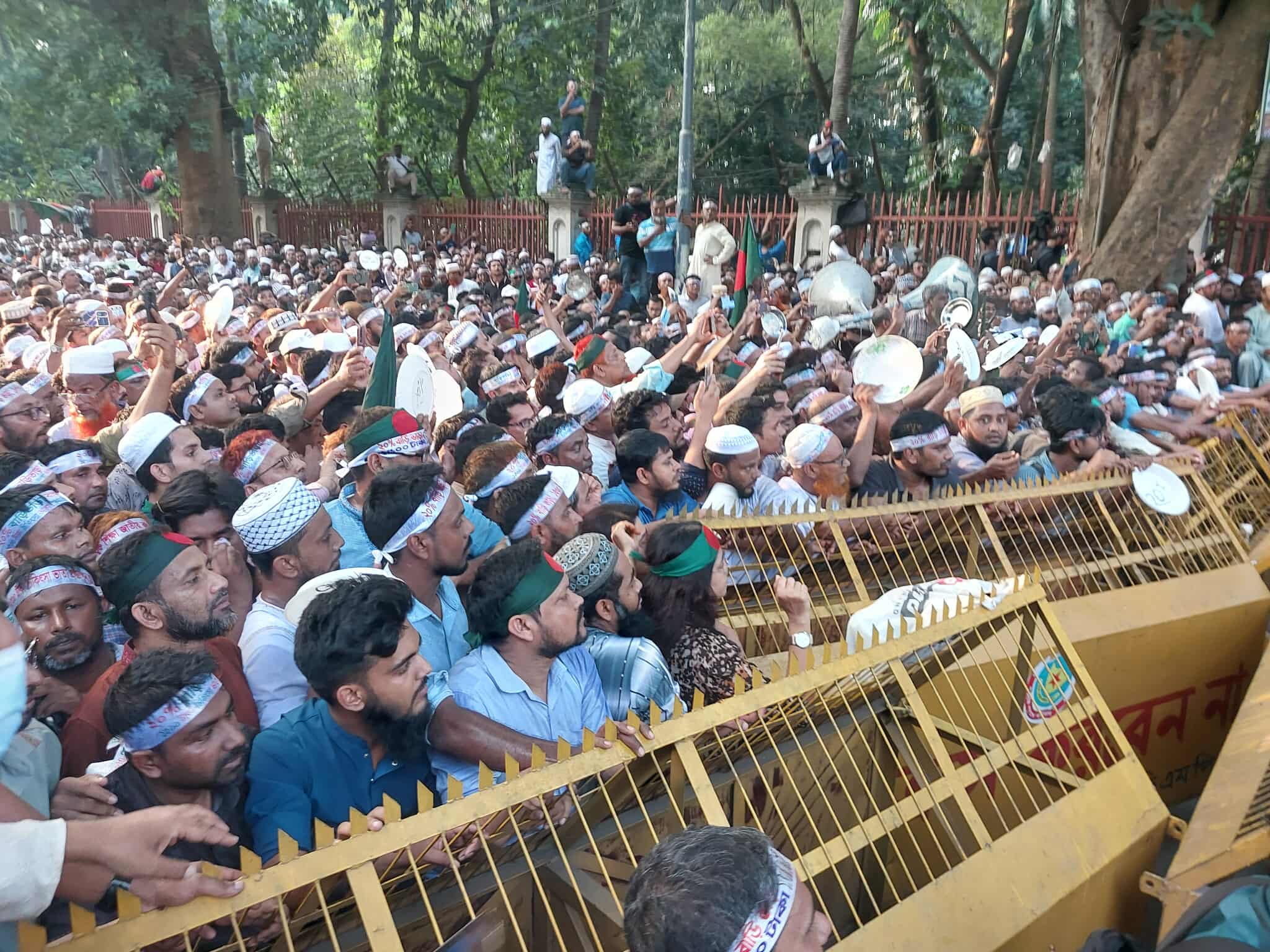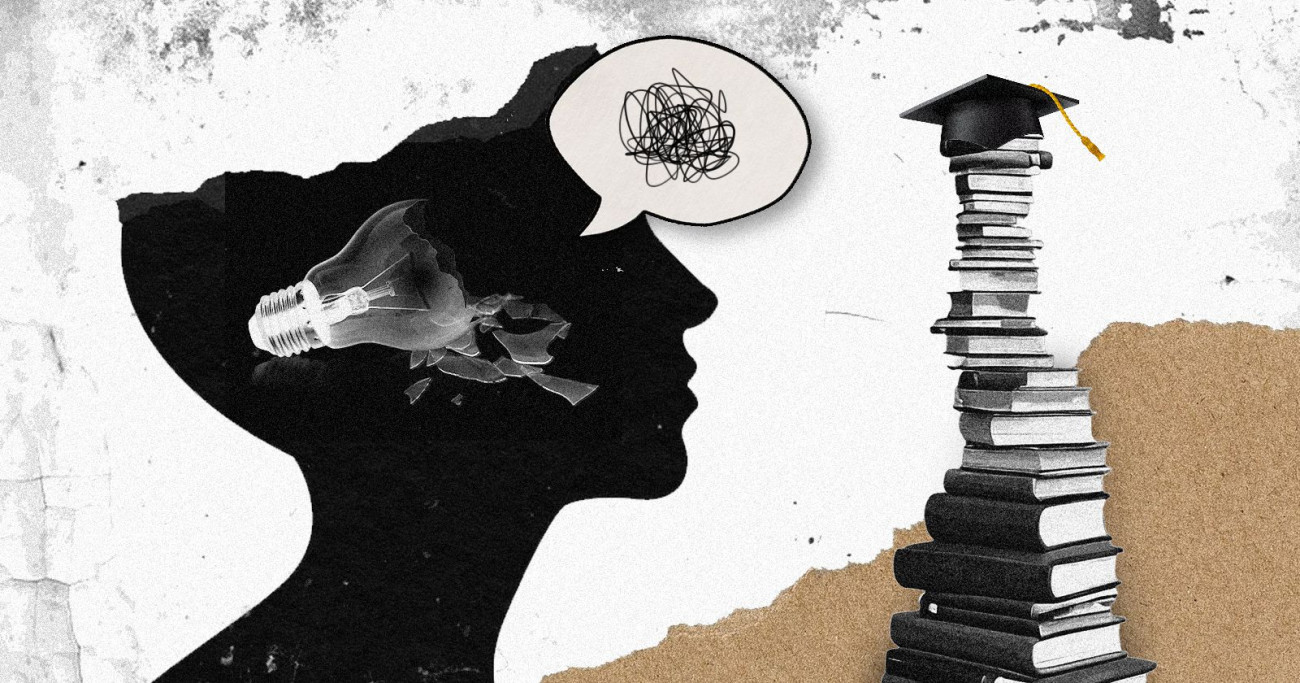‘Sir, I am a teacher’: The paradox in the cry

Last week, when police were seen dragging a man with a torn shirt in their effort to clear the road from a blockade imposed by teachers, we heaved a heavy sigh. The man was heard pleading, "Sir, I am a teacher. Don't beat me," while we as a nation took a walk of shame. But the shelf-life of any reaction today is shorter than the whisker of a foxtail. These short reels, which have become de facto news sources, simply scratch the surface and move away to find new baits.
They do not tell us the full story of how these teachers under the "Leaders of the Alliance for Nationalisation of MPO-Listed Educational Institutions" banner protested for a week and a half in the streets, seeking a 20 percent salary housing allowance, along with an increase in medical and festival allowances. After the police attack and public humiliation, the government initially offered five percent and then reluctantly agreed to raise allowances to 15 percent in two phases: 7.5 percent from November 1, 2025, then a further 7.5 percent from July 1, 2026. The partial concessions for teachers under duress are in contrast with the various plans to revise the pay structures for the cadre services by the National Pay Commission 2025. Privileges for recruiting and promotional activities, including holding examinations, interviews, setting questions, are being increased for government officials. Bangladesh Bank, too, has adopted a talent retention programme by increasing increment amounts for candidates with better results and performance in the foundation trainings.
These recommendations have reignited the old contest between administrators and educators. The moment, when a teacher addressed a police constable as "Sir," symbolised not only the pay disparity but also the erosion of teachers' dignity. For the university teachers, the cry is quieter than that of MPO or primary teachers—a muffled whisper in private chat groups. The absence of university teachers' associations after the fall of the previous regime has forced teachers to speak only in private. The mood in our WhatsApp groups is that of disappointment and resentment. University teachers, a potpourri of mismatched factions, lack the shared voice that school and college teachers or bureaucrats possess. They complain about the way civil servants are swiftly securing their interests. Even the online stakeholders' consultations organised by the pay commission do not interest public university teachers, as they consider them a chronicle of an outcome foretold. I am not aware of any initiative taken by the university administration to contact the interim pay commission, which has a six-month mandate to draft a new salary structure by December, with rollout likely in early 2026. Some proposed changes include keeping the pay ratio between the highest and lowest grades at 8:1 to 10:1. The commission wants to trim the existing 20 grades and increase medical and education allowances, which is a welcome move. For public university teachers and other members of semi-governmental institutes, there are supposed to be "targeted supplements." Sceptics, however, doubt any drastic change, as the current administration is not a political government with a crowd-pleasing electoral agenda.
It is very likely that the major restructuring may be delayed, and the teachers may continue to be deprived. Teachers are held in low esteem in our country. An assistant primary teacher still sits in Grade-13, the same as a computer operator and one step below an upazila accountant. A college professor ranks below a joint secretary. For the state, education is nothing more than clerical work—acknowledged only with certain reservations but never exalted.
Following the sharp decline in the HSC pass rate, criticism was directed towards teachers. A staggering 202 colleges had zero pass rates, most of which were non-Monthly Pay Order (MPO) institutions. They relied mostly on the low tuition fees without any additional government support. One editorial in this daily cites a teacher from one of these colleges who has been working for seven months without any pay. No wonder desperate teachers come to Dhaka to stage protests and face daunting water cannons or sound grenades, that too probably for a Tk 2,000-Tk 3,000 raise. Therefore, I have mixed feelings when government officers propose Tk 6,000 for an exam-related role, prompting university teachers to seek the same if not more.
The eighth pay scale (2015) stripped university teachers of increments for results, retirement benefits, timescales, and selection-grade promotions and downgraded their equivalence with senior bureaucrats. During the July uprising, teachers were seen demanding not only better pay but also dignity. Fatigue and fragmentation after the regime change have muted the call for an independent academic pay scale. The same pattern is repeated in semi-government research bodies. A scientific officer at Grade-9 earns between Tk 22,000 and Tk 53,000, often without the allowances enjoyed by their administrative counterparts. These are the top researchers and technicians who study climate resilience, disease prevention, and renewable energy or implement development projects, and yet they earn less than the officer who processes their project file.
Such disparity breeds corruption, as incomes fall below a decent living standard. Inflation and heavy taxation worsen it. Why are we not surprised that many of our technical graduates, such as doctors and engineers, are now vying for administrative, police, or customs jobs in the civil service examinations? Somehow, we have promoted a system that fattens the civil service managers and starves the mentors and scientists at the universities and other research organisations.
This imbalance is slowly eroding our system from within. The search for better homes among our new generations suggests that the country is far from congenial to merit. Education, at the expense of using a cliché, is the backbone of a nation. If you do not pay your educators, and if you create a system that makes educators cut corners and opt for compromises, then they become a poor role model for their students. What's needed now is not another token increment but a structural correction. First, we need to decide what we want from our educators. How much respect are we willing to give them? The pay hierarchy needs to be rational and pragmatic. We must establish an academic and research pay framework that equates senior professors and principal scientists with senior secretaries, both in pay and in prestige. Allowances should reward teaching excellence, publication, mentorship, and innovation, not just attendance. Housing, healthcare, and pension benefits must be equalised across cadres.
Equally vital is the system of listening to the collective grievances. Reviving independent, apolitical professional bodies is essential not just for negotiating pay, but for reclaiming dignity. We do not want our teachers touching the feet of a policeman, saying, "Sir, I am a teacher!"
Dr Shamsad Mortuza is professor of English at Dhaka University.
Views expressed in this article are the author's own.
Follow The Daily Star Opinion on Facebook for the latest opinions, commentaries and analyses by experts and professionals. To contribute your article or letter to The Daily Star Opinion, see our guidelines for submission.




 For all latest news, follow The Daily Star's Google News channel.
For all latest news, follow The Daily Star's Google News channel. 


Comments